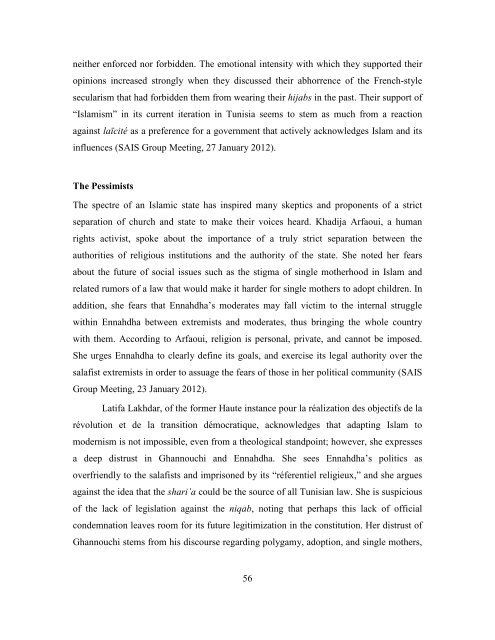Tunisia: Understanding Conflict 2012 - Johns Hopkins School of ...
Tunisia: Understanding Conflict 2012 - Johns Hopkins School of ...
Tunisia: Understanding Conflict 2012 - Johns Hopkins School of ...
You also want an ePaper? Increase the reach of your titles
YUMPU automatically turns print PDFs into web optimized ePapers that Google loves.
neither enforced nor forbidden. The emotional intensity with which they supported their<br />
opinions increased strongly when they discussed their abhorrence <strong>of</strong> the French-style<br />
secularism that had forbidden them from wearing their hijabs in the past. Their support <strong>of</strong><br />
“Islamism” in its current iteration in <strong>Tunisia</strong> seems to stem as much from a reaction<br />
against laïcité as a preference for a government that actively acknowledges Islam and its<br />
influences (SAIS Group Meeting, 27 January <strong>2012</strong>).<br />
The Pessimists<br />
The spectre <strong>of</strong> an Islamic state has inspired many skeptics and proponents <strong>of</strong> a strict<br />
separation <strong>of</strong> church and state to make their voices heard. Khadija Arfaoui, a human<br />
rights activist, spoke about the importance <strong>of</strong> a truly strict separation between the<br />
authorities <strong>of</strong> religious institutions and the authority <strong>of</strong> the state. She noted her fears<br />
about the future <strong>of</strong> social issues such as the stigma <strong>of</strong> single motherhood in Islam and<br />
related rumors <strong>of</strong> a law that would make it harder for single mothers to adopt children. In<br />
addition, she fears that Ennahdha’s moderates may fall victim to the internal struggle<br />
within Ennahdha between extremists and moderates, thus bringing the whole country<br />
with them. According to Arfaoui, religion is personal, private, and cannot be imposed.<br />
She urges Ennahdha to clearly define its goals, and exercise its legal authority over the<br />
salafist extremists in order to assuage the fears <strong>of</strong> those in her political community (SAIS<br />
Group Meeting, 23 January <strong>2012</strong>).<br />
Latifa Lakhdar, <strong>of</strong> the former Haute instance pour la réalization des objectifs de la<br />
révolution et de la transition démocratique, acknowledges that adapting Islam to<br />
modernism is not impossible, even from a theological standpoint; however, she expresses<br />
a deep distrust in Ghannouchi and Ennahdha. She sees Ennahdha’s politics as<br />
overfriendly to the salafists and imprisoned by its “réferentiel religieux,” and she argues<br />
against the idea that the shari’a could be the source <strong>of</strong> all <strong>Tunisia</strong>n law. She is suspicious<br />
<strong>of</strong> the lack <strong>of</strong> legislation against the niqab, noting that perhaps this lack <strong>of</strong> <strong>of</strong>ficial<br />
condemnation leaves room for its future legitimization in the constitution. Her distrust <strong>of</strong><br />
Ghannouchi stems from his discourse regarding polygamy, adoption, and single mothers,<br />
56
















